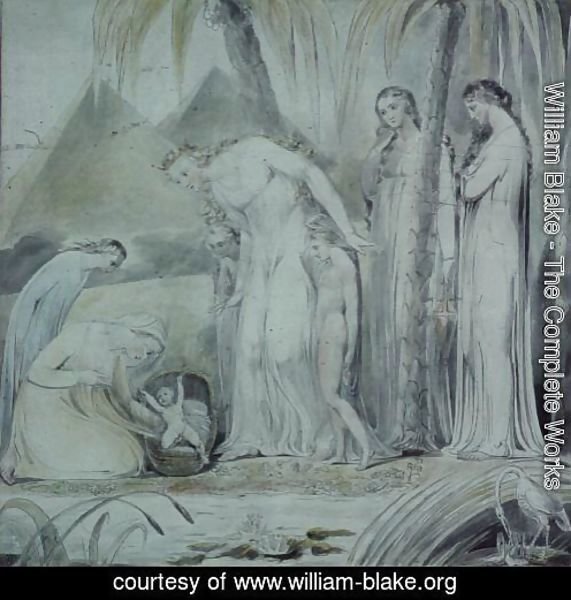The Compassion of Pharoah's Daughter
The Finding of Moses
from Victoria & Albert Museum
courtesy of www.william-blake.org
Songs & Ballads, (E 491)
"Auguries of Innocence
The Babe is more than swadling Bands
Throughout all these Human Lands
Tools were made & Born were hands
Every Farmer Understands
Every Tear from Every Eye
Becomes a Babe in Eternity
This is caught by Females bright
And returnd to its own delight"
Exod.2
[1] And there went a man of the house of Levi, and took to wife a daughter of Levi.
[2] And the woman conceived, and bare a son: and when she saw him that he was a goodly child, she hid him three months.
[3] And when she could not longer hide him, she took for him an ark of bulrushes, and daubed it with slime and with pitch, and put the child therein; and she laid it in the flags by the river's brink.
[4] And his sister stood afar off, to wit what would be done to him.
[5] And the daughter of Pharaoh came down to wash herself at the river; and her maidens walked along by the river's side; and when she saw the ark among the flags, she sent her maid to fetch it.
6] And when she had opened it, she saw the child: and, behold, the babe wept. And she had compassion on him, and said, This is one of the Hebrews' children.
[7] Then said his sister to Pharaoh's daughter, Shall I go and call to thee a nurse of the Hebrew women, that she may nurse the child for thee?
[8] And Pharaoh's daughter said to her, Go. And the maid went and called the child's mother.
[9] And Pharaoh's daughter said unto her, Take this child away, and nurse it for me, and I will give thee thy wages. And the woman took the child, and nursed it.
[10] And the child grew, and she brought him unto Pharaoh's daughter, and he became her son. And she called his name Moses: and she said, Because I drew him out of the water.
In the light of Blake's system of thought the babe in the picture of the finding of Moses means more than a simple illustration of an event. The appearance of the babe signals a transition to altered circumstances. The babe Moses became a seminal figure in the development of the culture of the Israelites. The sojourn and slavery on the Israelites in Egypt was brought to an end through the instrument of Moses. But the child was to absorb much from the culture of Egypt by being raised by the daughter of Pharoah.
Blake's poem The Mental Traveller can be seen to be related to the situation which Moses exemplified. He was taken in by the Egyptian culture, grew strong, overcame the ties which held him, and led his people to a new freedom. Blake sees the transformations which must occur in individual and societies in the symbol of the birth of the vigorous, insistent babe.
Songs & Ballads, (E 483)
"The Mental Traveller
I traveld thro' a Land of Men
A Land of Men & Women too
And heard & saw such dreadful things
As cold Earth wanderers never knew
For there the Babe is born in joy
That was begotten in dire woe
Just as we Reap in joy the fruit
Which we in bitter tears did sow
And if the Babe is born a Boy
He's given to a Woman Old
Who nails him down upon a rock
Catches his Shrieks in Cups of gold"
.
Blake seeks to provide the Golden String which can lead us through the labyrinth of our experience or his own poetry.
Thursday, November 17, 2011
Subscribe to:
Post Comments (Atom)


No comments:
Post a Comment